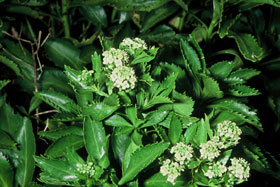ETYMOLOGY:
From Proto Nuclear Polynesian *Nau, a generic name for certain prostrate or creeping plants with aromatic and/or medicinal attributes, through:
Proto Central Eastern Polynesian *Nau, Pimelia spp. (Brassicaceae)
|
Watch this space! This is one of the first pages written in 2009 for the prototype stage of this web site, which has been transferred with minimal changes to the newer format. It is still therefore very much under construction, but contains the essential linguistic and botanical information, and both updated text and pictures will be added progressively as soon as time permits (new pages for plant names not yet discussed are being given priority). If you would like this page to be updated sooner than planned, please email a note to temaarareo at gmail.com.
 Throughout Eastern Polynesia, except for Easter Island, the word nau denotes a member of the genus Lepidium, plants known in English as "pepperworts", with medicinal properties and a fragrant or pungent smell. DNA analysis of the Hawaiian species indicated a Californian origin, but they have been growing in Hawaii for at least 350,000 years, so clearly it was not people who distributed them into the Pacific. The New Zealand species Lepidium oleraceum was once common but is now rarely encountered. Throughout Eastern Polynesia, except for Easter Island, the word nau denotes a member of the genus Lepidium, plants known in English as "pepperworts", with medicinal properties and a fragrant or pungent smell. DNA analysis of the Hawaiian species indicated a Californian origin, but they have been growing in Hawaii for at least 350,000 years, so clearly it was not people who distributed them into the Pacific. The New Zealand species Lepidium oleraceum was once common but is now rarely encountered.
[The NZ Plant Conservation Network's newsletter, TriIepidea, for May 2020 has a very interesting and comprehensive article by Peter de Lange discussing this plant -- and the stories surrounding it, as well as other members of the same genus.]

Reserved for photograph - yet to come
(Aroha mai!)
|

Reserved for photograph - yet to come
(Aroha mai!) |
|
Photographs: The inset photo of Lepidium oleraceum (Nau), taken on Matariki Island in Southland, is by the late John Smith-Dodsworth (c) NZPCN. We are grateful to the the photographer's family for permission to use his work.
Citation: This page may be cited as: R. A. Benton (2009) "The Māori plant name Nau" (web page periodically updated), Te Māra Reo. "http://www.temarareo.org/TMR-Nau.html" (Date accessed)
(Hoki atu ki runga -- Go back to the top of the page.) |

